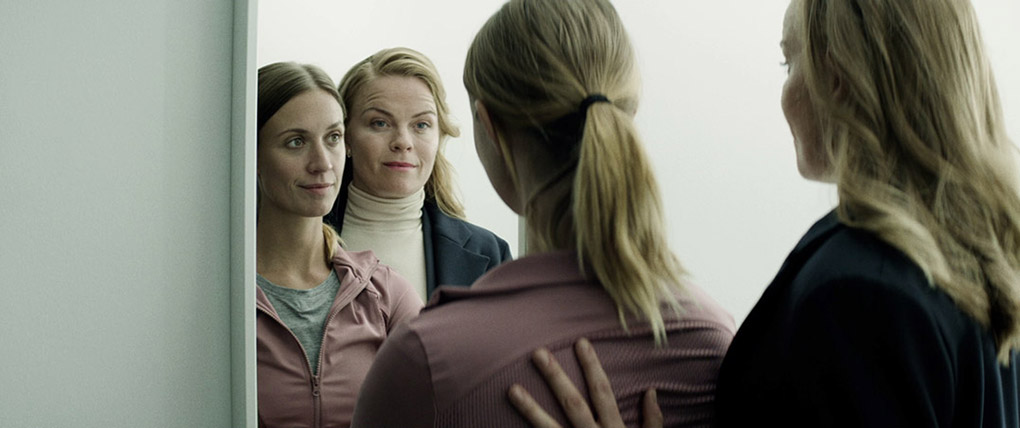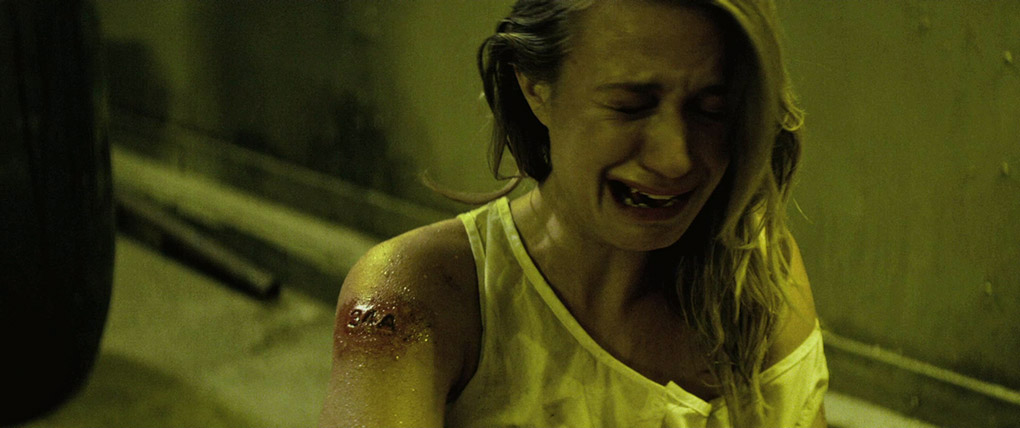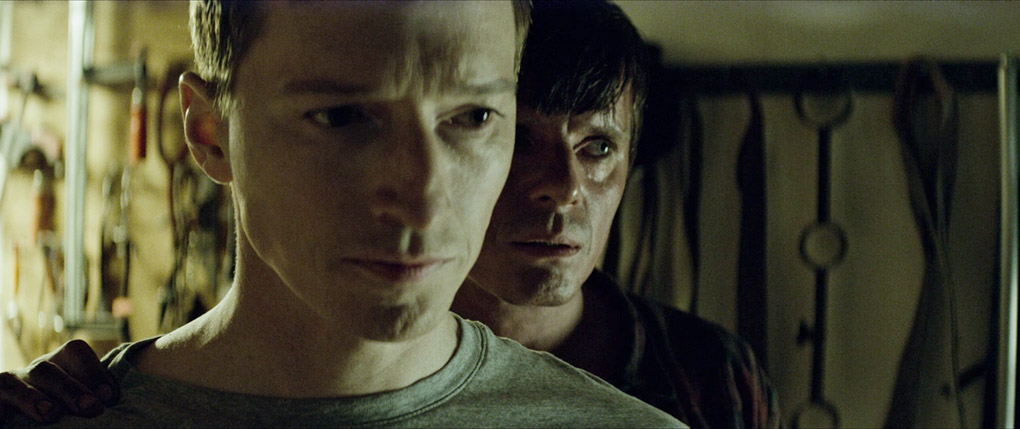|
Equestrian rider Mia Lindberg (Sara Hjort Ditlevsen) is aware that her biological clock is ticking and would like to have a child, but husband Thomas (Anders Heinrichsen) doesn’t seem that interested in sex these days. They live in a well-appointed, ultra-modern house that was doubtless paid for by Thomas’s partnership in a pharmaceutical firm run by Dr. Isabel Ruben (Signe Egholm Olsen). When Ruben reveals in a TV interview that the company has developed a technique for reversing the ageing process in men, Thomas is alarmed by what he believes is a premature public revelation. He immediately calls Ruben and asks here to come to the house to discuss this unexpected move, and when she arrives she finds Mia assisting her neighbour’s over-burdened young Russian au pair Nika (Eeva Putro) with her shopping and her young charge. Ruben pauses to admire Nika’s “beautiful” hair, and in the process of fingering it gets it caught in her ring. She quickly untangles herself and apologises, but secretly slips a strand of Nika's hair into her pocket. Hello… Once inside, Ruben deflects Thomas’s concerns about going public with a process that’s technically still in the trial stage, after which she makes a point of admiring Mia’s beauty. If I wasn’t already convinced that she was up to no good, I’d suspect that she rather fancied our Mia. It turns out that she has rather different designs on her.
A brief early drift through the bowels of a grim-looking facility, coupled with a close-up photo of an unidentified shoulder with a number branded into it that Mia discovers when she logs in to Thomas’s email account, gives only a hint of the dark nature of Ruben’s work. We get a more sinister taste when Nika is heading home that very evening and is knocked out and kidnapped by a couple of unpleasant goons that we later learn are called The Dog (Morten Holst) and The Pig (Jens Andersen). Could they be bad guys with names like that? Once she’s in the back of their van, Nika is branded in a manner reminiscent of that image on Thomas’s email server, but when her kidnappers take a wrong turn and have to clumsily reverse, she manages to break free from her bonds and escape from the vehicle. The next morning, she turns up at Mia and Thomas’s front door, all battered and bleeding and in a terrified state. Mia tries to calm her and tells Thomas to get a blanket, but as he walks off he spots the branding on Nika's shoulder and quickly makes a secret and inaudible phone call. Putting two and two together here is not much of a strain and probably wasn’t intended to be, as when Thomas convinces Mia to let him take Nika to the hospital, I immediately began shaking my head and groaning. Unsurprisingly, he takes her instead to the very same facility we caught a brief glimpse of during the title sequence, where she is hauled out of the car by The Dog and dragged inside. Thomas, somehow, is startled by this. Mia, meanwhile, is calling hospitals to enquire about Nika’s condition, but nobody seems to know anything about her. The savvy Mia then uses a ‘find my phone’ app on her computer to pinpoint Thomas’s location and heads there to find out what the hell is going on. Shortly after arriving she is remotely let in by a watching Ruben, then quickly finds herself punched into a dazed state by The Dog and dragged into a grimy underground cell. Here she is forced to strip and don a medical gown, then is restrained on the floor and has an identification number branded into her shoulder.

First up, I’ll salute to any film that instead of having characters accidentally dropping their mobile phone or holding it aloft and complaining that there’s no signal, makes a plot point of the ability to pinpoint the location of such a device using its GPS capabilities. A shame, then, that shortly after entering the facility, Mia falls through a floor – one that I presume has just been waiting for her arrival to finally collapse – and breaks her phone, preventing her from calling for help in the all-too familiar manner. This approach to a common component of modern horror movies is symptomatic of the sometimes schizophrenic nature of screenwriter Sissel Dalsgaard Thomsen and director Jens Dahl’s film, one whose pertinent commentary on emerging science and embracement of new technology is a little at odds with some distinctly old-school horror movie tropes. In the interview on this very disc, for example, screenwriter Thomsen says she intended the film as a feminist statement, which is certainly a sound subtext for a modern horror thriller. But while the film does make good on this intention in its final scenes, a good deal of the build-up sees it wander into the sort of torture porn territory I thought we’d moved on from by now, with young women imprisoned, occasionally naked and physically abused at length by an animalistic male.
Then there are the logic problems, so to speak. That Ruben is developing her treatments in secret is understandable given the process she’s using to produce the required results (I’m going to avoid specific spoilers here), but I can’t help thinking that to achieve this end would also require the women she has had kidnapped to be kept in antiseptically clean conditions, not in dank and grubby cells that would likely be home to various vermin and a whole range of potential infections. And while there’s no doubt that Ruben is going to need a couple of ruthless goons to kidnap her victims and keep them in line, she at one point reminds The Dog that she hired him specifically because he gets off on subjugating and brutalising women. Given the value of the kidnap victims to her work, is that really the best qualification for the help? Oh, I’m sure she knows best. After all, sociopaths are such reliable and trustworthy employees who always follow orders and never act on their base instincts.
I also have a bit of an issue with Thomas’s decision to drive the distraught and injured Nika back to the facility. I get that he recognised the branding and realised that taking her to hospital would expose the operation and that he followed Ruben’s instructions on this because she has something potentially very damaging on him. But I’m calling bullshit on his later claim that he thought the women were volunteers and that he didn’t know they were being kidnapped and forced to participate against their will. He certainly may have once, but you’re telling me that the truth still didn't dawn on him when Nika showed up in such a terrible state claiming she was kidnapped and had that branding on her shoulder? Then again, given the intended subtext, maybe this was intended as a comment on his willingness to turn a blind eye to an unpleasant reality in order to protect himself in the light of what Ruben knows about him. Here, all men are bastards to one degree or another. And so is that woman.

Breeder may be only Jens Dahl’s second feature as director (his first was the 2017 3 Things, which I’ve not seen and which does sound interesting), but he got his start in film in 1996 as co-screenwriter with Nicolas Winding Refn on the latter’s terrific debut feature as director, Pusher, so he clearly knows a thing or two about how to tell a tense and involving story. Breeder is certainly slickly made, has its share of unsettling sequences (the immobilisation and kidnap of Nika is particularly creepy), and includes a genuinely horrifying moment when one character is advised not to look at something that some audience members might be similarly advised to avoid. The actors also deliver the goods, with Sara Hjort Ditlevsen having to run the gamut of emotions as Mia, though it’s the unnerving realism of Eeva Putro’s terror as Nika that unsettled me the most. Signe Egholm Olsen is suitably icy as Ruben (I tip my hat to Kim Newman, who in his review noted her resemblance to British actress Rachel Roberts), and while Morten Holst teeters on the brink of ‘monstrous assistant’ cliché as The Dog, he still makes for a genuinely unpleasant figure that you ache to see get his comeuppance, preferably at the hands of those he kidnaps and so badly mistreats.
The film does flirt briefly with a couple of ideas in the early scenes, where actions are inversely mirrored by later events, something that could probably have benefitted from further exploration. As the film opens on Mia riding and stabling her horse, for example, she reflects (in the film’s only use of voice-over) on the level of control she is able to exercise over the animal and whether she is effectively its jailer. That she also expresses a dislike of dogs here because she was once bitten by one is a tad on-the-nose given the nickname of her later tormentor. When she does find Thomas in the mood for love, however, her preference is to be spanked with a leather belt, something Thomas ultimately cannot bring himself to act on, a play version of the sort of physical abuse Mia will later experience for real. More effective is the film’s dig at pharmaceutical companies that engage in deeply unethical practices to develop products exclusively for the rich and powerful, and it’s interesting that as the film begins the treatment only works on men and is thus, despite being developed by a woman, an exclusively male preserve. The decision of screenwriter Thomsen to switch Ruben’s gender from male to female also works as a comment on women who elect to become as ruthless and irredeemably unethical as their male counterparts to succeed in world in which men still dominate. I'll bet Priti Patel thinks Ruben is the film's hero.
For me, Breeder is an odd and only partially successful endeavour. It carries a worthy message about the practices of Big Pharma and has a climactic turnaround of fate that’s ripe for the sort of subtextual reading that I can’t get into here without delivering massive spoilers, but its journey to that point has overtones of the torture porn cycle we all thought had run its course. It’s certainly a sometimes uncomfortable watch, but Martyrs it ain’t, and while the climax does deliver both the cathartic and subtextual goods, I have a feeling opinion will be split about whether the ends justify the narrative means.
A 1080p 2.38:1 transfer of a film that I’m guessing was shot, edited and mastered digitally and which thus would have no reason to display any analogue flaws like dust or physical damage, and it doesn’t. Detail is crisp, the contrast well graded and the often golden-hued colour palette is cleanly and consistently rendered. A solid job.

The 5.1 DTS-HD Master Audio soundtrack is of a very high quality, displaying an excellent level of clarity and a strong dynamic range, as well as distinct separation in the front of the sound stage and subtle but detectable work at the rear.
Optional English subtitles kick on by default but can be disabled using the remote, but there is no option to do so in the menu.
Interview with Director & Screenwriter (9:13)
A short but still welcome interview with screenwriter Sissel Dalsgaard Thomsen and director Jens Dahl, conducted in Danish with English subtitles. Dahl describes the film as a a free interpretation of the Bluebeard story blended with a modern tale about biohacking, an area of concern for him due to the huge sums of money being invested by the wealthy into research into life-extending treatments that they will doubtless keep for themselves. Thomsen, meanwhile, sees the film as a feminist statement about the systems that women and people of low status are subjected to in a modern society, and the importance of standing up against them. Both comment on how horror is the ideal genre to carry such subtextual messaging, and it’s here that Thomsen reveals that she originally wrote Ruben as a man, then saw the logic in switching the character’s gender.
Not bad, but not great, Breeder feels a little like a film that has missed its time window, but it’s solidly made and convincingly performed, and the underlying message does make its mark before the end. The lack of special features is the norm for a release on Eureka’s Montage Pictures label, and I’ve certainly no complaints about the transfer. Fans of this particular subset of the horror genre might want to check this one out, but pregnant women should proceed with caution.
|